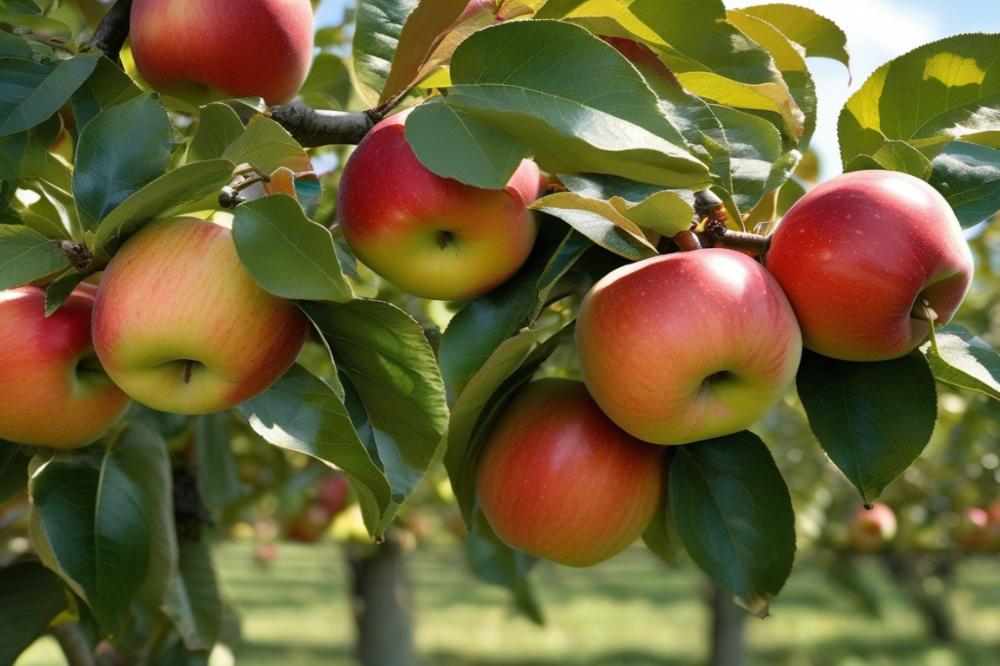Introduction
The Roxbury Russet Apple holds a special place in the world of fruit cultivation. This heirloom variety traces its origins back to the early days of America, with a rich history that captures the spirit of New England. Often celebrated for its unique flavor, this apple is a testament to the enduring tradition of home gardening and local farming.
In the context of apple varieties, the Roxbury Russet stands out as a symbol of heritage apples. These fruits are not just another source of produce; they reflect the culture and practices of generations of growers. New England’s orchards were once filled with this exceptional variety, showcasing the area’s commitment to preservation and quality.
Raising Roxbury Russets requires dedication and understanding of their cultivation needs. Many home gardeners today are rediscovering heirlooms like this apple, eager to connect with history through their gardens. Beyond aesthetics, the flavor profile and texture offer an authentic taste of the past.
Exploring this fruit’s significance reveals much about New England’s agricultural identity. In a time when many common varieties dominate the market, the Roxbury Russet serves as a reminder of the diversity that once thrived. Embracing heritage apples can enrich our relationship with food and the land.
The History of Roxbury Russet Apples

Origins and early cultivation
Roxbury Russet Apples trace their roots back to the early 1600s in New England. Early settlers brought various apple varieties to America, but the Roxbury Russet stood out. It was first cultivated in Roxbury, Massachusetts. Farmers appreciated this heirloom fruit for its hardiness and resilience. The apples thrived in the rocky soil and varied climate of the region. They grew on small orchards typically owned by local families. During this period, farming practices were simple yet effective. Heirloom apples became a vital part of daily life for many, providing both sustenance and a touch of comfort.
Role in New England heritage
New England has a rich agricultural legacy, and this apple plays a significant role within it. Many families can trace their lineage alongside the growth of these fruit-bearing trees. The distinct flavor of Roxbury Russet has become intertwined with local traditions. Cider making was a popular use for these fruits, especially in the colder months. As towns grew and communities formed, these apples became a symbol of New England. They represented a connection to the land and a sense of belonging. Events celebrating local produce often highlight their importance. The apple’s history is steeped in stories passed down through generations.
Historical significance in the apple industry
Throughout history, the Roxbury Russet gained recognition in the apple industry. Farmers recognized its potential early on, leading to more widespread cultivation. Back then, diverse apple varieties were less common, making this one stand out. The unique characteristics helped farmers establish a name for themselves in the market. While it competed with more popular apples, it carved a niche with its loyal following. Preservation efforts have become essential in maintaining this heritage fruit. Today, some orchards still grow these apples, keeping the history alive. They are a testament to the perseverance of farmers who appreciate age-old traditions.
Cultivation Techniques for Roxbury Russet Apples

Ideal Growing Conditions and Climate Considerations
Roxbury Russet apples thrive best in New England’s temperate climate. Warm summers and cool fall weather are essential for developing their rich flavor. Trees prefer well-drained soil with good organic content. Avoiding heavy clay soils is advisable as they can cause root issues. Proper sunlight exposure also plays a critical role in growth, so select a location that gets plenty of afternoon light. Additionally, seasonal changes are important for the tree’s development, as a chilling period helps the buds to form properly.
Best Practices for Planting and Caring for Trees
Planting should happen in early spring or fall when the roots are dormant. Keep spacing in mind; trees need room to grow. A distance of at least 20 feet between each tree will give them adequate air circulation. The first few years are crucial. Regular watering encourages strong roots, especially during dry spells. Mulching is effective for moisture retention and weed prevention. Pruning helps improve air flow and promotes healthier fruit production. Look for signs of disease or distress frequently.
Pest and Disease Management Strategies
Pest control can be a challenge in apple orchards. Monitoring for apple scab and powdery mildew should be routine. Organic solutions like neem oil are popular among heritage farming enthusiasts. Beneficial insects can also aid in pest management; ladybugs and lacewings are great natural predators. Crop rotation and diversity among companion plants can reduce pest pressures. Moreover, maintaining healthy and vigorous trees lowers the risk of disease. Preservation of heirloom apples like this one relies on good practices in both farming and management.
Flavor Profile and Uses of Roxbury Russet Apples

The flavor of these apples is distinct. Many people describe it as sweet with a hint of nuttiness. The texture can be quite firm and crisp, making it enjoyable to bite into. Some say it also has a slightly grainy feel, which adds to its charm. This combination makes Roxbury Russet a favorite among those who prefer apples with depth.
Culinary Uses in Recipes and Preservation Methods
In the kitchen, these heirloom apples shine. They are perfect for pies, cider, and even sauces. Bakers often use them for their ability to hold shape during cooking. Because of their flavor, they can transform a simple dish into something special. Preservation methods include canning, drying, and making apple butter. Many of these techniques have been passed down through generations in New England. Each method highlights the apple’s rich heritage, offering a taste of history in every bite.
Comparison with Other Apple Varieties
When compared to other apple varieties, Roxbury Russet stands out. Granny Smith apples, for example, are tart and crisp, while the Russet holds a more complex flavor profile. Honeycrisp apples are known for their sweetness and juiciness, but Roxbury Russet offers a more robust taste. Many consider them an heirloom variety because they have been cultivated for centuries. This apple not only carries historical significance but also adds depth to dishes that others cannot match.
Farmers appreciate the benefits of growing these unique apples in their orchards. They adapt well to the New England climate, thriving in specific soil types. Cultivation practices have evolved, but many traditional methods remain. This approach helps maintain the apple’s integrity and rich flavors, ensuring each season brings a delicious harvest.
Preservation of Roxbury Russet Apples
Heirloom varieties like Roxbury Russet Apples carry a rich history that reflects the farming traditions of New England. Preserving these unique fruits is crucial for maintaining biodiversity in agriculture. Without preservation, many apple varieties could disappear, leaving only a few commercial types on grocery store shelves. This loss would mean not just a reduction in flavor but also a decline in our agricultural heritage.
Several strategies can be employed to maintain Roxbury Russet genetics. First, grafting and propagation techniques are essential. By grafting branches from existing trees onto rootstocks, farmers can create new trees that share the same genetic material. It allows the flavors and qualities of the original variety to persist through generations. Seed banks also play a vital role. Storing seeds collected from heirloom apples can safeguard their genetic diversity against future threats.
Orchards serve as critical components in conservation efforts. Many growers have taken an interest in cultivating these old apple varieties, creating environments where heirlooms can thrive. Community-supported agriculture (CSA) models help connect local farmers with consumers eager to support heritage crops. Additionally, educational programs are often established to teach people about these apples and their significance.
Through dedicated farming practices and a collective appreciation for our agricultural heritage, we can maintain the cultivation of such valuable apple varieties. The commitment to growing and enjoying these fruits helps keep their stories alive. In doing so, we pave the way for future generations to experience the rich flavors and history they represent.
Roxbury Russet Apples in Modern Farming
Current trends in apple farming emphasize sustainability and biodiversity. Many farmers are adopting practices that protect the environment while growing crops. Organic farming, for example, has seen a rise in popularity. This method avoids synthetic pesticides and fertilizers, promoting healthier soil and ecosystems. Those who produce heirloom varieties, like the Roxbury Russet, find value in maintaining genetic diversity. Growing these older apple types supports local food systems and resonates with consumers interested in heritage foods.
Community-supported agriculture programs are becoming more common. These initiatives connect farmers directly with consumers. Buyers can receive fresh produce, often including rare apple varieties, by subscribing for seasonal harvests. This creates a sense of partnership between the farm and community members. It also aids in the preservation of unique crops that might otherwise dwindle in popularity.
In New England, the cultivation of heritage apples varies among orchards. Some growers are focusing on customer preferences while preserving the past. Interest in the nostalgic flavor and historical significance of apples drives demand for these varieties. As a result, the future looks bright for the Roxbury Russet in gardening. With dedicated growers maintaining their cultivation, opportunities will arise for new generations to explore these fascinating fruits. Local gardening clubs and community orchards may begin to promote them more actively.
Looking to the Future
The Roxbury Russet apple stands as a testament to the rich tapestry of agricultural history. Its journey from the orchards of New England to modern gardens showcases the enduring appeal of heirloom varieties. This apple isn’t just another fruit; it carries stories of past generations who cherished its unique flavor and texture. Recognizing its significance helps us understand the importance of preserving heritage crops.
Home gardeners are encouraged to embrace this heirloom variety. By cultivating Roxbury Russet apples, you can play a vital role in keeping a part of history alive. Growing apples from the past enhances your gardening experience while also contributing to biodiversity. The satisfaction of harvesting and tasting a fruit with such deep roots is truly rewarding.
Final thoughts revolve around the importance of preserving apple heritage in personal gardens. Every sapling planted is a nod to our agricultural legacy. As we nurture these trees, we celebrate the flavors that shaped our past. Future generations deserve to enjoy these fruits, just as we do today. Start small, plant an heirloom seed, and keep the tradition alive. Your garden can become a vital part of apple history.



